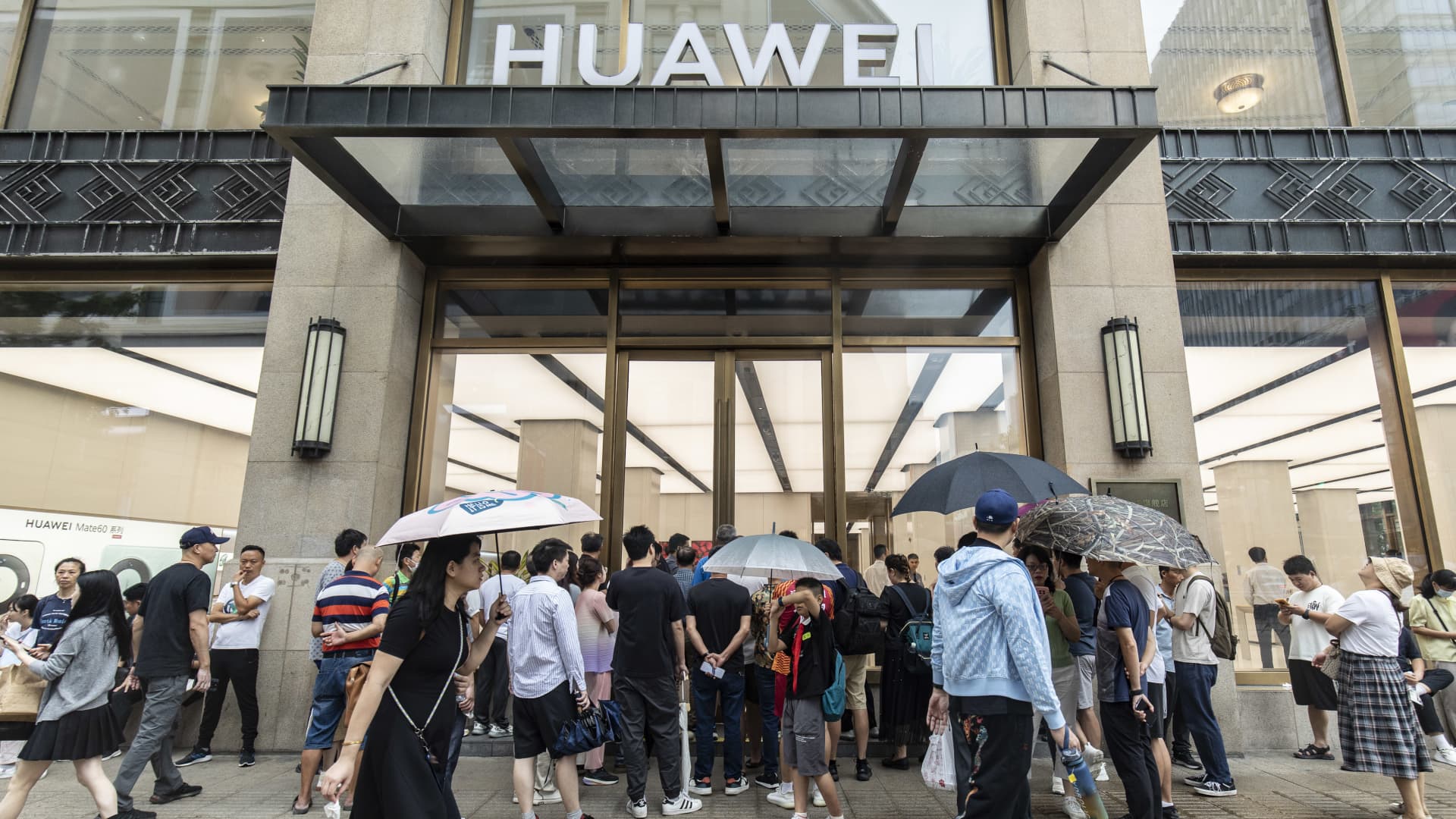Facebook shares rise as investors focus on earnings beat and look past whistleblower document dump

Facebook Chairman and CEO Mark Zuckerberg testifies at a House Financial Services Committee hearing in Washington, October 23, 2019.
Erin Scott | Reuters
Facebook investors shrugged off the massive ongoing document dump on Monday, and instead focused on the company’s third-quarter earnings, which topped analysts’ estimates.
The company also said it’s adding $50 billion to its stock buyback program, helping lift the shares about 2% in extended trading.
Here are the results.
- Earnings: $3.22 vs $3.19 per share expected by analysts, according to Refinitiv.
- Revenue: $29.01 billion vs $29.57 billion expected by analysts, according to Refinitiv.
- Daily active users (DAUs): 1.93 billion vs. 1.93 billion expected by analysts, according to StreetAccount.
- Monthly active users (MAUs): 2.91 billion vs. 2.93 billion expected by analysts, according to StreetAccount.
- Average revenue per user (ARPU): $10.00 vs $10.15 expected by analysts, according to StreetAccount.
Facebook will make significant changes in the next year to focus more on its full-screen video Reels feature, which competes directly with TikTok, CEO Mark Zuckerberg told analysts on the earnings call. It’s part of an effort to make Facebook and Instagram more appealing to users between the ages of 18 and 20.
“Over the last decade as the audience that uses our apps has expanded so much and we focus on serving everyone, our services have gotten dialed to be the best for the most people who use them rather than specifically for young adults,” Zuckerberg said.
He warned that, “this shift will take years, not months, to fully execute,” and that ultimately it will be as significant to Facebook as the adoption of the News Feed and Stories features.
“Reels has the potential to be something of that scale,” he said.
Zuckerberg kicked off the earnings call with a vehement defense of his company, following an onslaught of reports that stemmed from documents leaked by France Haugen, a whistleblower and former employee.
This internal company documents released by Haugen showed that the number of teenage users of the Facebook app in the U.S. has declined by 13% since 2019, with a projected drop of 45% over the next two years. The number of users between the ages of 20 and 30 was expected to decline by 4% during that time frame, the documents showed.
Facebook whistleblower Frances Haugen giving evidence to the joint committee for the Draft Online Safety Bill, as part of government plans for social media regulation.
House of Commons – PA Images | PA Images | Getty Images
Haugen initially shared documents with the Wall Street Journal, which published a series of stores on them, and she then appeared in front of a Senate panel earlier this month to testify about her experiences at the company. Since then, Haugen has released documents to several more news outlets, leading to additional news articles.
The reports show that Facebook is aware of many of the harms its apps and services cause, particularly to teenage girls, but either doesn’t rectify the issues or struggles to address them. More documents are expected to be shared daily over the coming weeks.
Zuckerberg refuted the claims and referred to the latest news cycle as “a coordinated effort to selectively use leaked documents to paint a false picture of our company.”
He touted Facebook’s investments in research and said the rest of the industry should follow its lead.
“The reality is social media is not the main driver of these issues and probably can’t fix them by itself either,” Zuckerberg said. “We should want every other company in our industry to make the investments and achieve the results that we have.”
The metaverse is coming
Facebook is priming investors for a company that could look very different than the advertising-based business of today.
The company announced its plans to break out Facebook Reality Labs into its own reporting segment starting in the fourth quarter. That unit focuses on hardware, augmented reality and virtual reality products. The other revenue segment will come from its family of apps, which include Facebook, Instagram, Messenger, WhatsApp and other services.
Oculus Quest 2
Facebook expects its investment in the hardware and VR segment to reduce operating profit in 2021 by approximately $10 billion.
In July, Facebook announced the formation of a team that would work on the metaverse, digital worlds in which multiple people can interact within a 3D environment. Two months later, the company said it would elevate Andrew “Boz” Bosworth, who is currently the head of Facebook’s hardware division, to the role of chief technology officer in 2022.
In the meantime, the ad business keeps growing at a healthy clip.
Facebook said revenue in the third quarter rose 35% from a year earlier, while net income rose 17% to $9.2 billion, from $7.8 billion a year prior.
‘Headwinds’ from iOS
The company said it expects fourth-quarter revenue of $31.5 billion to $34 billion. Analysts were projecting sales of $34.8 billion. Facebook said the forecast “reflects the significant uncertainty we face in the fourth quarter in light of continued headwinds from Apple’s iOS 14 changes, and macroeconomic and COVID-related factors.”
Apple introduced privacy changes earlier this year, adding prompts that allow users to keep from being targeted with ads on apps. Snap shares plunged 27% on its earnings report last week after the company blamed the iOS changes for a disruption to its business.
CFO Dave Wehner said that the iOS changes were the “largest headwind” in the quarter and, if not for that, “we would have expected sequential growth from Q2 to Q3.”
The iOS changes hurt Facebook’s ability to target ads to users and, as a result, “we don’t see the same level of conversion data coming through,” Sheryl Sandberg, Facebook’s operating chief, said on the call. Facebook will rebuild its targeting and optimization systems to work with less data, a process that will take multiple years, Sandberg said.
Sandberg told analysts that the company experienced slowing e-commerce growth as more businesses open up from the Covid-19 shutdowns and consumers return to making purchases in person.
“Businesses are still making the shift online, but e-commerce is no longer growing at the pace it was at the height of the pandemic,” Sandberg said.
Sandberg also noted that advertisers have slowed spending in response to global supply chain issues and labor shortages. Still, Sandberg said, Facebook remains “the best platform for advertisers to reach people where they are and get measurable outcomes.”
Revenue from Facebook’s “other” segment, including consumer hardware such as Oculus virtual reality headsets, totaled $734 million, up 195% and more than the $477 million StreetAccount consensus estimate.
The company’s free cash flow of $9.55 billion fell short of the $9.9 billion StreetAccount consensus.
Facebook said in the third quarter it had 3.58 billion monthly users across its family of apps, up from 3.51 billion in the second quarter. This metric is used to measure Facebook’s total user base across its main app, Instagram, Messenger and WhatsApp.




